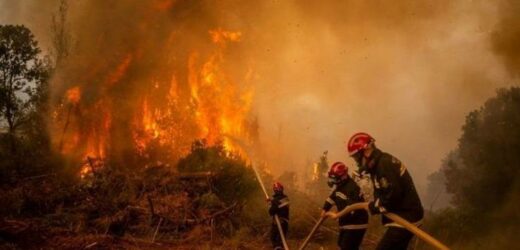Turkey wildfire: Blaze ‘engulfs’ road on fifth day
We use your sign-up to provide content in ways you’ve consented to and to improve our understanding of you. This may include adverts from us and 3rd parties based on our understanding. You can unsubscribe at any time. More info
And a Royal Society Professor of Earth Sciences has warned that there will likely be more to come if we continue on this trajectory. An Intergovernmental Panel on Climate Change (IPCC) report showed immediate and large-scale environmental efforts must be made to “avert climate catastrophe”.
It revealed the global surface temperature was 1.09C warmer than in the decade 2011-2020 – compared to 1850-1900.
Speaking to the Express.co.uk, Eric Wolff, Royal Society Professor of Earth Sciences and the University of Cambridge, warned natural disasters will plague the Earth more intensely and regularly if the Earth continues to warm.
“For the most part there isn’t a threshold below which we get no effects and above which it’s all a disaster, but the more we warm the more often we’ll be reading about fires, droughts, floods and heatwaves,” Professor Eric Wolff said.
In Sicily, Italy, recorded temperatures have reached 48.8C – and some believe these temperatures are the hottest in European history.
READ MORE: Extreme weather warning: 48C to roast Europe – alert


The record has yet to be officially verified by the World Meteorological Organisation (WMO), but would break the previous record of 48C – set in Athens in 1977.
An anticyclone has been labelled “Lucifer” as it tore through the southeast Sicilian city, Syracuse.
If the world heats by a further four degrees, heavy rainfall events that used to occur once a decade would occur nearly three times as often, the IPCC report suggests.
The kind of heatwave which occurs once every 50 years would occur almost every year, researchers warned.
DON’T MISS
British crews fighting Greek wildfires [UPDATE]
Athens at risk as Greece wildfires rage out of control [REVEAL]
Europe fires LIVE: Blaze sweeps Greece, Turkey, Italy – 8 dead [LIVE]

Professor Wolff added: “If it’s warmer and the soil is drier, that makes the likelihood of forest fires much higher.
“In other words, the kind of natural disaster we’d see are similar to today, such as floods, heatwaves, droughts, wildfires, but they would occur much more often, some would be more intense than seen before, and they would start to occur in regions that haven’t experienced them before.”
In Algeria, at least 25 soldiers have died in wildfires while attempting to save residents in villages east of the capital.
On Tuesday night, the President announced at least 17 civilians have died in the fires.

Residents of the Greek island Evia were forced to flee their homes and evacuate the island by boat as the fires spread out of control.
More than 2,000 residents have now been evacuated from their homes and local officials are appealing for more help.
The IPCC report found that the past five years have been the hottest years on record since 1850.
Compared with 1901-1971, the recent rate of sea levels rising has nearly tripled.
Heatwaves and other hot extremes have “virtually certainly” become more frequent, and human influence is “very likely” to be the cause of the glaciers melting.
However, scientists have said that, while this report is concerning, there is still hope the crisis can be averted in the next decade.
“If we combine forces now, we can avert climate catastrophe,” UN Secretary General António Guterres said.
“But, as today’s report makes clear, there is no time for delay and no room for excuses.
“I count on government leaders and all stakeholders to ensure COP26 is a success.”
The United Nations Climate Change Conference, or COP26, will be held in Glasgow this November.
Source: Read Full Article


